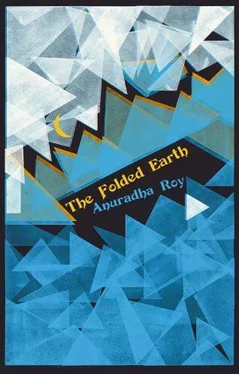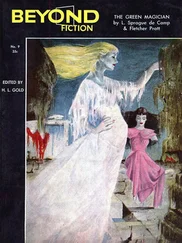Later, soaked and irritable, Mr Chauhan walked into his house, and when Mrs Chauhan said in a voice full of concern, “How did you get so wet?” he shouted, “In the line of duty! I got wet in the line of duty!” He had forgotten to take off his muddy shoes at the door. They left a trail over a new carpet as Mr Chauhan went towards the bedroom, yanking his sopping shirt from the tight waistband of his trousers. Mrs Chauhan gave the carpet a look and slapped her forehead in exasperation. “ Offo ! What did I say? It’s become impossible to talk in this house, even a simple question.” She telephoned her sister in Lucknow for solace. “This job’s stress is really getting him down. Day and night, he’s never relaxed, not for one minute. And now I’ll have to send this carpet to you to be dry-cleaned. No dry-cleaner’s even seen a real Kashmiri carpet in this place or even in Haldwani.”
Mr Chauhan overheard her from the bedroom. He sat on the bed with his head in his hands. A damp patch grew around him as water seeped out from his wet clothes. He pressed his fingers on his Australia-shaped birthmark, which throbbed to the beat of his agitated pulse. He unearthed a hidden packet, lit a cigarette with a match that shook, and resolved that this time he would teach Puran a lesson he would never forget.
* * *
Burdened with her new preoccupations, Charu no longer remembered to steal grain from Ama’s store for Puran’s deer. He had to wait every morning for his mother to leave their rooms for the few moments that it took him to steal some of the hen’s grain from her storage tin, just a little bit every day so that she would not notice. This, combined with the freshest of the rotting fruits and vegetables that Charu brought back from the bazaar for her cows, supplied the food for his baby barking deer, which had grown steadily over the past five months, and was now more body, less leg. When he took the food to the shed and whispered, Rani, Rani, he saw her large, dimly-glowing eyes turn in his direction, but she did not get up until he had set the grain and fruit in the usual place and withdrawn some distance away.
One afternoon that August, when he called to Rani on returning from grazing the goats, he saw there was empty space in the place in the shed where her eyes should have been. The shed was tiny. Even so, he scrambled around as if the deer might be hiding under the heaps of hay and sacking strewn on the floor. She had wandered off twice in the past, and both times he had rushed about the hills like a man possessed, only calming down when he had found her and shepherded her back to the shed, all the while making mewling noises of relief. When he did not find her in the shed that afternoon, he ran down to the slope where he usually took her to graze and survey the world of commoners. She must have gone off without him again, he thought. He felt his heart turn into a cold, heavy stone at the thought of leopards, jackals, foxes, dogs — all waiting to savage her.
Puran walked the slopes calling for Rani in his loud, hoarse, hollow voice, until Charu heard his calls and came to see what the matter was. She searched the slopes with him: they went in different directions, came back, met, and asked each other, “Did you see her?” and separated again. They went deeper into the valley that led to the Dhobi Ghat; they walked every path through the pine forests to the north, the oak forests to the east, and then started searching the path through the woods to the bazaar. They clambered over the boulders near the stream that cut across the shortcut to the bazaar and at the narrow bridge over the stream they encountered Joshi, the forest guard. “Your deer is at the police station,” the guard told them. “You crazy fool, Puran, don’t you know it’s illegal to keep those deer at home? What were you thinking? It’s not a pet dog or a goat, it’s a deer. Chauhan Sa’ab’s order: it’s going to the Nainital zoo.” Charu and Puran hardly waited for him to finish what he was saying. They panted their way up the slope they had just run down and then over the short cut to Mall Road where the police station was, with the forest guard’s voice in their ears: “Don’t go, he’ll put you in the zoo as well. They have zoos for mad people in Nainital!”
The police station was on a hillock above Mall Road, a yellow, two-roomed cottage with a red roof. It had no more than a rudimentary lock-up that was occupied only sometimes, usually by drunk people who needed to sleep off their fog. The constable in charge was a tall, sharp-featured woman from the plains who had a reputation for being tough with lawless motorcyclists and water-thieves. She had a tight bun, she carried a stout, polished stick to brandish at the unruly, and was never seen dressed in anything but her khaki uniform sari that she pinned up like a neatly folded napkin.
Charu and Puran reached the door of the station gathering the courage to reason with her, and found it empty save for the chowkidar peeling onions in the veranda. Through the main room they could see the bars of the lock-up and Puran ran in, despite the chowkidar yelling “O Puran”, and getting up hastily to stop him. Puran was on his haunches before the bars in a moment.
Rani was pacing around behind the bars of the lock-up. Twice, as they watched, her hooves slid on the polished floor, and she knocked her head against the wall on the other side. Puran held the bars and rocked back and forth. Something between a moan and a sob burst from him, then turned into rhythmic keening sounds.
“Let her out,” Charu begged the chowkidar. “Let her out, she will die.”
The chowkidar ticked them off in a loud, hectoring voice. “How dare you,” he said. “This is a police station, not your house that you come in and do as you please.” He yelled to whoever might be listening, “We are the police, what do you think, that we have all the time in the world for lunatic cowherds?”
Puran sat by the bars of the lock-up groaning and calling Rani’s name. He had some of her grain in his pockets and he scattered it on the floor of the lock-up, but Rani paid no attention to him. It was as if she had not noticed him at all. The skin on her back trembled and shuddered in spasms of fright; the whites of her eyes were flecked with red. In despair, Puran pulled at the lock on the grille, banging it against the iron rods to break it. The chowkidar grabbed his arm and pulled him aside shouting, “Saala, this is government property. What do you think you’re doing?”
Charu recognised that she was up against a force too powerful for her. Why would a police chowkidar — far less someone as elevated as the constable — pay attention to her? She thought of the only person she knew she could turn to. His words would count with the police. They would have to obey him. She ran to Puran to explain, then sped off, bounding over every available shortcut, her pink plastic slippers slipping and sliding on the monsoon-mossed rocks.
It was no use trying to finish reading the newspaper. Ama had arrived with the story of a certain Mangesh who worked for Missis Gracie long ago. He put her into one of those orphanages for old people, she said, and swindled her house away. And his wife, “That woman Asha, you’ve seen her, of course — tall and thin as a bamboo pole, with a voice that reaches the next valley even when she whispers, but she thinks she’s pretty — she has put a spell on my cow Ratna, she gives no milk at all any more.” Ama moved a ball of chewing tobacco from one of her cheeks to the other as she spoke and sat down with a groan on the staircase leading to Diwan Sahib’s veranda.
Diwan Sahib scowled at me and at Ama, and hauled himself out of his chair, retreating behind a line of dripping blue hydrangeas that separated his garden from the nettles below. I glimpsed his hands fumbling at his waist, and after a moment’s pause heard the sound of trickling water on grass. All else was quiet but for the tapping of a woodpecker making its way up a nearby tree trunk, grub by grub. Ama sighed, then said: “He is half mad. Pisses into the bushes like some common villager and they say he was a prince before. He drinks so much he keeps falling down. Did you hear, he fell down yesterday too? His shoulder has a big black mark. Himmat Singh told me.”
Читать дальше












